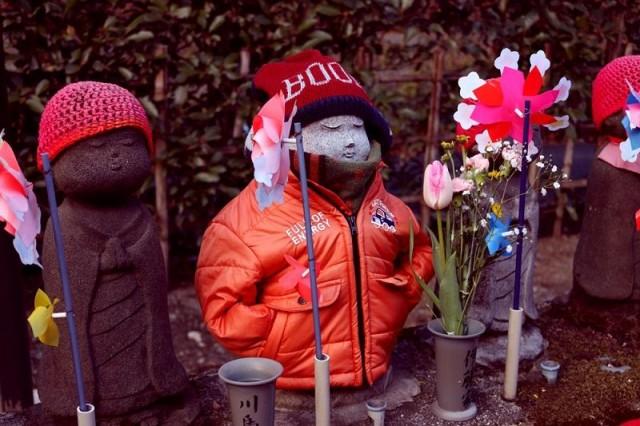'Mizuko kuyou': a memorial service in Japan for parents who have had miscarriage or stillbirth
When Saab Magalona decided to write about her painful experience of losing one of her twins as she gave birth, she put to front one of the most heartbreaking experiences anyone can go through.
How do parents who have had a miscarriage or experienced stillbirth or lose a newborn mourn and move on?
Shiba Park in the Minato neighborhood of Tokyo provides one of the best places to view one of Japan's iconic landmarks, Tokyo Tower.
The tall structure overlooks the Buddhist temple Zoujou-ji, where one can take a quiet stroll or get an O-mikuji Fortune. Out on the courtyard, there is a rack where you can leave bad fortune behind. It's a familiar tradition for tourists, but a few feet away, there's an area that offers a more penetrating experience.
Left of the temple is Sentai Kosodate Jizo, a garden where a number of stone sculptures of children are on view. The children are adorned with red bibs and caps; on their feet lay flowers and windmills.

These "mizuko" (literally "water child") provides parents a way to mourn a life that had not come into being.
Mizuko kuyou is a memorial service that parents who have had miscarriage, stillbirth, or abortion may choose to undergo. A Buddhist priest presides over the ceremony and he recites a sutra. The parents or parent offers a gift — incense, flowers, food — to the stone sculpture and it stays on the temple grounds.
There are variations to the ritual, especially in Buddhist temples outside Japan and Asia.
Writing for The New York Times in 2002 about her own experience, Peggy Orgenstein said that most other religions overlook miscarriage and discussion on the subject is often squelched.
"Without form, there is no content. So even in this era of compulsive confession, women don't speak publicly of their loss. It is only if your pregnancy is among the unlucky ones that fail that you begin to hear the stories, spoken in confidence, almost whispered," Orgenstein shared.
Orgenstein said her farewells to her unborn child at the Sentai Kosodate Jizo in Zoujou-ji. She writes about her experience:
I hadn't expected, coming from a world that fights to see life's beginnings in black and white, to be so comforted by a shade of gray. Yet the notion of the water child made sense to me. What I'd experienced had not been a full life, nor was it a full death, but it was a real loss. Maybe my mizuko will come back to me more fully another time, or maybe it will find someone else. Surprisingly, even that thought was solace.
Orgenstein said that she wasn't "completely at peace" as she left the temple, but the chance to say goodbye made her feel lighter.
In an interview with NPR in 2015, photographer Ali Smith shared her experience of chanting with other people who also lost their babies. When it came time for her to select a name for the four children she lost to miscarriage and place them on the altar, she realized that she was not alone.
"I just remember looking up and seeing there were so many, so many little pieces of paper there, with so many names on them. All of a sudden, it was impressed upon me the enormity of all the pain that people go through. And you never have any idea," Smith told NPR.
Losing a child is a painful experience. There is literally no word for a parent who has lost a child. But honoring your child, especially the newborn and the unborn might be the catharsis parents need to move on. — LA, GMA News



